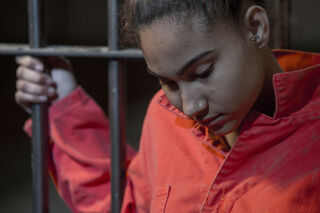Health
Dobbs Will Increase America’s Mass Incarceration
Personal Perspective: A post-Dobbs world will increase criminal prosecutions.
Posted November 1, 2022 Reviewed by Hara Estroff Marano
Four months have now passed since Dobbs v. Jackson Women’s Health Organization (2022) imposed a paradigm shift on women’s health care. In considering the costs inflicted by the state’s “legitimate interest” in women’s bodies and, more broadly, how a post-Dobbs world affects us all, there will be an inevitable increase in women who will face criminal prosecution.
America’s Mass Incarceration Problem
The United States has the highest per-capita incarceration rate in the world (with 639 prisoners per 100,000 residents). We house 4 percent of the world’s total population but 16 percent of the world’s incarcerated population. While the American prison population has grown 700 percent between the 1970s and the 2000s, the general population has grown just 150 percent. A conservative estimate regarding the cost of America’s mass incarceration is $80 billion per year (and this estimate is already now five years old).
Women represent less than 10% of the incarcerated population, but that proportion is skyrocketing. As of 2019, there were well over 200,000 women being held in jails and prisons nationwide.

Female Injustices
While the proportion of wrongful convictions involving women is roughly equivalent to the proportion of incarcerated women, there are notable disparities. For instance, an analysis of recorded exonerations revealed that women were three times more likely to be wrongfully convicted of a crime that never actually occurred. In many of these cases, mothers were blamed for tragic accidents involving children. Recall the case of Melissa Lucio, which I covered back in March.
Abortion bans will inevitably increase the scrutiny mothers face when children are the victims of uncontrollable or unforeseen tragedies.
Prosecuting Abortions = Prosecuting Women
In 14 states, abortions are now effectively illegal, and most of these states make no exceptions for rape or incest. It is now possible that victims of sexual crimes could be prosecuted more effectively than their assailants (fewer than than 1 percent of rapists actually face a felony conviction).
While many mainstream pro-life advocates claim that they oppose criminal prosecution of women who seek abortions, such claims are questionable. From 2006 to 2020 (before Dobbs), more than 1,300 women were criminally investigated, detained, or arrested because of their pregnancy outcomes. There is also a growing movement of “abortion abolitionists” who believe that abortion is homicide and that women should be punished accordingly. According to a Pew Research survey, 14 percent of Americans now believe that women should serve jail time if they have an illegal abortion.

No state currently has a statute criminally prosecuting women who cross state lines to obtain an abortion, but such decisions are are not without consequences (for those who can even afford such an option). Oklahoma and Texas, for instance, have passed laws allowing private citizens (in any state) to sue individuals suspected of “aiding or abetting” an abortion (post ~6-weeks) for up to $10,000 per illegal abortion. This law could presumably include doctors, nurses, drivers, and others.
Medical Abortions
Interestingly, while politicians have been locked in a decades-long debate regarding the morality of abortion, doctors have developed new, safe methods of performing the procedure. Namely, nonsurgical (or medical) abortions are on the rise. The pills required can now be prescribed by a doctor virtually and mailed directly to patients. It is noteworthy that the incidence of complications did not significantly increase when the pills became more accessible, that is, no longer requiring in-person doctor visits.
The Underground Abortion
The dramatic shift in accessibility of abortions has led to an inevitable outcome. Throughout world history, when a significant contingent of the population finds a law to be unjust, they find a way to break the law and help others break it as well. An underground network of “pill fairies” now provides women with the medication needed to end their pregnancies. No questions asked. At the risk of criminal prosecution, women are helping women regain control of their autonomy.
This is far from an ideal solution, and some of these women are likely to face criminal prosecution. Although four men (and one woman) limited the rights of 50 percent of the country, they have not eliminated the power of individuals to judge right from wrong.



